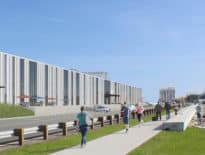
Matthew Pullen
Greater Boston’s life science hub has outgrown its birthplace in Kendall Square/East Cambridge. The submarket has posted net absorption of more than 570,000 square feet per year since 2013. Today, it boasts a 0 percent direct vacancy rate for Class A laboratory space and rental rates approaching $100 per square foot, triple net. That is driving laboratory tenants to search for space beyond this land-constrained center.
Laboratory developers are rapidly emerging as some of the most active bidders on land sites throughout the region. The most attractive laboratory development markets are those that provide connections to the Cambridge innovation economy via a shared border or its primary transportation corridors – Route 2 and the MBTA Red Line, also known as the “Brain Train” for its access to Harvard and MIT.
Four life science markets have therefore emerged beyond the streets surrounding MIT in East Cambridge/Kendall Square: Somerville, the Seaport District, Columbia Point and Waltham/Lexington.
Somerville – Somerville’s most notable development site is XMBLY, which encompasses approximately 9 acres adjacent to Assembly Row. With approximately 1.5 million square feet of total massing potential, XMBLY is envisioned as a dynamic, mixed-use campus including a substantial laboratory component in addition to creative office, R&D and multifamily. By virtue of Somerville’s direct adjacency to Cambridge, XMBLY is well poised to draft off of the innovation hub’s insatiable laboratory tenant demand.
Seaport District, Boston – There are currently three proposed developments with significant life science potential on the market in the Seaport District, where rents for new laboratory construction are averaging $65 per square foot, triple net.
Channel/Side is a proposed 1 million-square-foot mixed-use development with the potential to include a substantial life science component.
Parkside on A is a fully permitted development site with approximately 250,000 square feet of laboratory/creative office potential. Both projects are walking distance from the Red Line’s Broadway station, just five stops from Kendall Square.
310 Northern Ave. is a 4.2-acre mixed-use development site with up to 780,000 square feet of total massing potential, offering a prime opportunity for laboratory developers. With Silver Line access to South Station, the property also offers direct access to the Red Line.
Columbia Point, Boston – UMass Boston is currently in the process of divesting the former Bayside Expo Center, a 20-acre development site located directly adjacent to the university’s campus in Columbia Point. The university envisions transforming the property into a dynamic mixed-use destination similar to East Cambridge/Kendall Square, with a sizable life science component. The Bayside site is walking distance to the Red Line’s JFK/UMass station, just seven stops from Kendall Square.
Waltham/Lexington – Work is currently underway on two notable laboratory land use projects in Waltham near the Lexington border, where new construction laboratory rental rates range from the mid $40s to low $50s per square foot, triple net.
225 Wyman St. is a fully permitted 500,000-square-foot development that is primed for laboratory or office construction within the city’s Hobbs Brook Office Park.
900 Winter St. is a 220,000-square-foot laboratory and office facility currently under construction to accommodate an expansion for Alkermes, a global biopharmaceutical company, within the city’s Reservoir Woods campus.
Both projects are situated just moments from Route 2, which provides access to Cambridge in approximately 20 minutes.
This clear shift in land use toward life science developments – and tenant demand for more affordable laboratory space – will enable the Boston area to accommodate Cambridge’s demand overflow while facilitating direct synergies with this key innovation hub. Life science developments in alternative locations are crucial to ensuring Greater Boston continues to attract and retain a world-class laboratory tenant base.
Matthew Pullen is an executive managing director with Newmark Knight Frank’s capital markets group in Boston and is chair of the ULI Boston/New England District Council.




 |
| 

